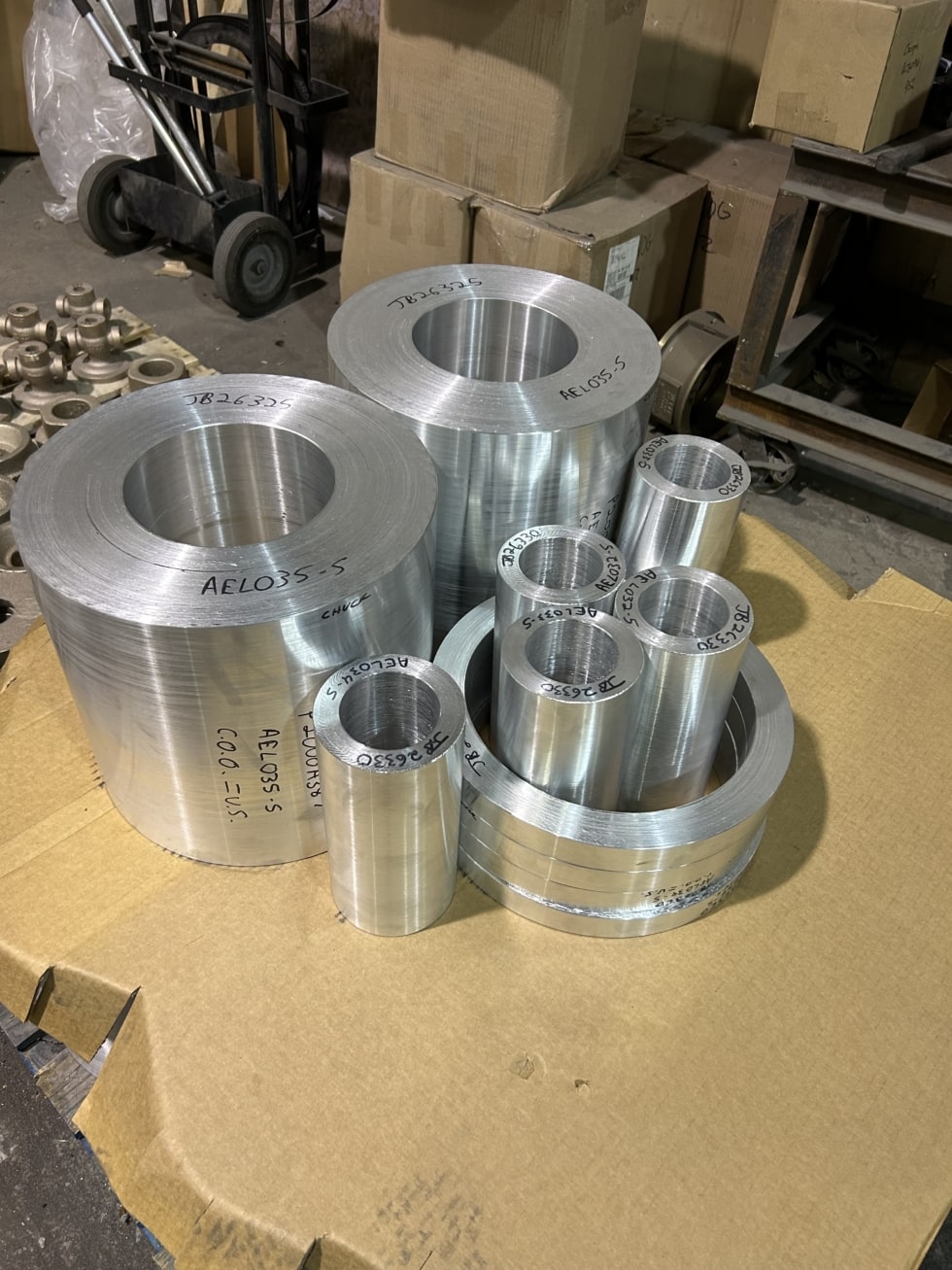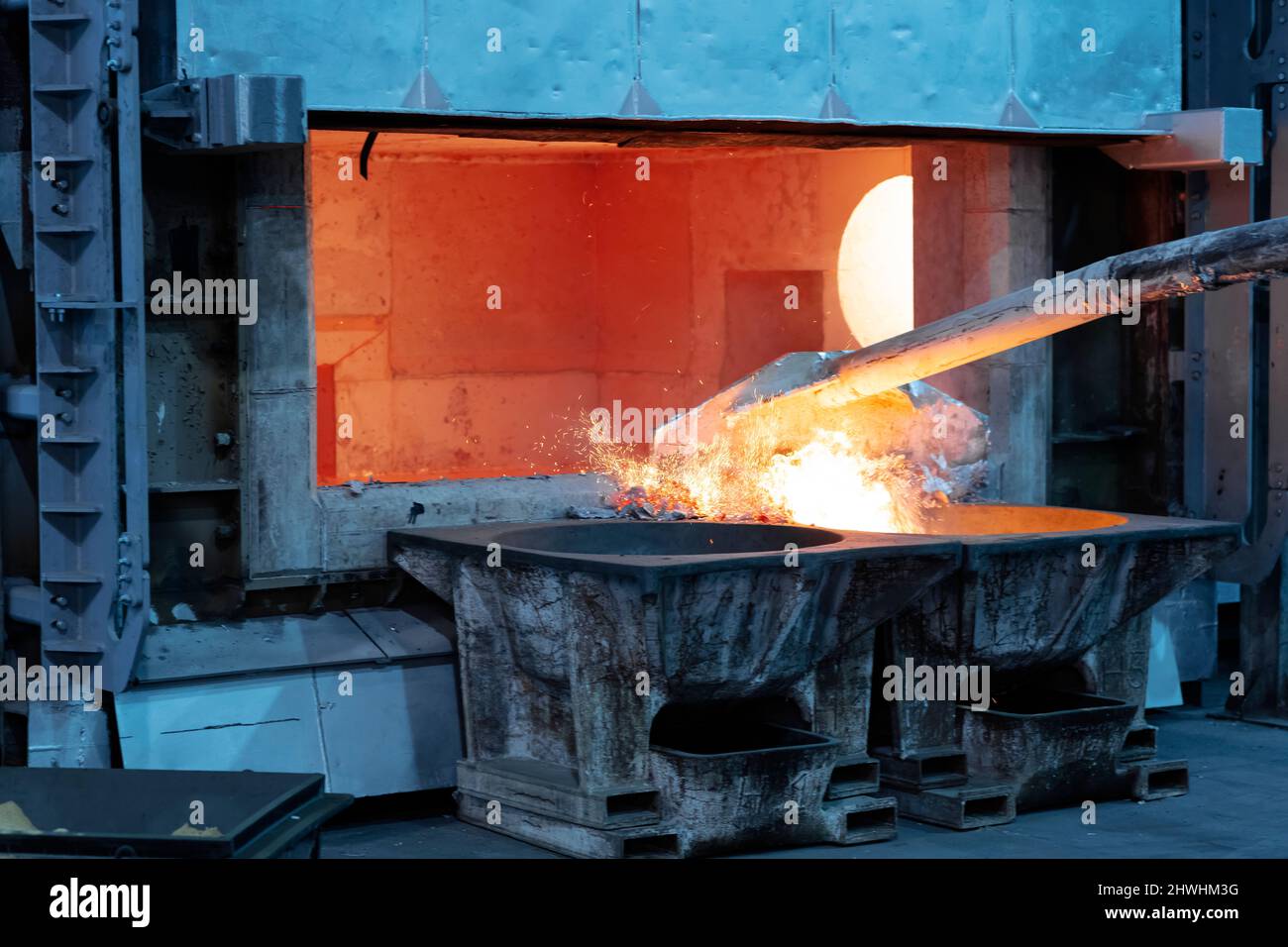Understanding the Benefits and Innovations in the Aluminum Foundry Market
The Aluminum Foundry sector plays a crucial role in contemporary manufacturing. Its lightweight residential or commercial properties especially improve gas performance, specifically in automobile and aerospace sectors. On top of that, Aluminum's resistance to deterioration assurances long life in various applications. As the market progresses, technologies such as innovative recycling and additive production are improving manufacturing methods. Exploring these developments exposes not just the advantages however also the difficulties ahead for Aluminum foundries in a swiftly transforming market.
The Lightweight Benefit of Aluminum
Aluminum's lightweight nature uses significant benefits throughout various markets, particularly in manufacturing and transport. Its low density permits the production of components that are easier to deal with and mount, leading to reduced labor costs and enhanced efficiency. In the automotive market, lighter automobiles add to boosted gas economic situation and lower emissions, straightening with worldwide sustainability goals. In a similar way, in aerospace, the use of Aluminum minimizes the general weight of airplane, which is crucial for improving efficiency and lowering functional costs.
In addition, Aluminum's lightweight residential properties facilitate cutting-edge designs that were formerly impractical with heavier products. This adaptability makes it possible for makers to develop intricate forms and structures while keeping architectural integrity. In general, the light-weight advantage of Aluminum not just enhances product efficiency yet additionally drives improvements in technology and design, making it a recommended material in different applications.
Corrosion Resistance and Longevity
The Aluminum Foundry industry is renowned for generating products with remarkable deterioration resistance, making them perfect for different applications. This home, integrated with enhanced architectural integrity, adds to the long-lasting performance advantages that Aluminum parts use. Because of this, industries significantly rely upon Aluminum to meet requiring environmental conditions without jeopardizing top quality.
Superior Deterioration Resistance
While different metals encounter considerable difficulties from ecological aspects, Aluminum attracts attention for its superior rust resistance, making it a favored option in numerous applications. This building is mainly as a result of a natural oxide layer that forms on the Aluminum surface, giving a barrier versus wetness and corrosive agents. Unlike other steels that may rust or weaken over time, Aluminum preserves its honesty even in harsh atmospheres, such as commercial settings or seaside areas. Furthermore, its light-weight nature integrated with deterioration resistance makes it perfect for applications in aerospace, automotive, and marine markets. In general, Aluminum's remarkable longevity not just enhances item long life but additionally decreases upkeep costs, providing a compelling benefit for manufacturers and consumers alike.
Enhanced Architectural Integrity
Developers and designers progressively acknowledge the relevance of boosted structural honesty in modern-day applications, where both rust resistance and resilience are critical. Aluminum alloys, known for their light-weight buildings, likewise exhibit extraordinary resistance to corrosion, making them suitable for severe settings. The ingenious methods utilized in the Aluminum Foundry market add significantly to generating elements with improved toughness. Advanced casting procedures and alloy compositions are tailored to satisfy details efficiency demands, making certain that structures can withstand severe conditions without compromising stability. Surface therapies and layers enhance the lifespan of Aluminum products, further mitigating damage over time. This emphasis on enhanced structural integrity not only expands the use of materials but additionally decreases upkeep costs, strengthening Aluminum's placement as a product of selection in various markets.
Durable Efficiency Benefits
Durable performance in Aluminum parts is greatly connected to their premium corrosion resistance and resilience. Unlike numerous metals, Aluminum normally forms a protective oxide layer, which protects against corrosion and deterioration in numerous environments, consisting of commercial and marine setups. This intrinsic property considerably expands the life expectancy of Aluminum items, reducing upkeep and replacement expenses. Additionally, the lightweight nature of Aluminum enhances its applicability throughout markets without jeopardizing toughness. The product's resistance to damage likewise adds to its dependability popular applications, making it an optimal option for automotive, aerospace, and building markets. As sectors increasingly prioritize sustainability and durability, Aluminum's efficiency advantages align with modern engineering needs, solidifying its function in ingenious manufacturing procedures.
Ecological Influence and Sustainability
 As the Aluminum Foundry market develops, it significantly prioritizes ecological influence and sustainability, recognizing the requirement for responsible methods in the face of environment modification. Initiatives to minimize waste and power consumption are at the forefront, with many factories embracing reusing campaigns to reclaim Aluminum scrap. This not only decreases resources usage however also see here now significantly reduces energy expenditure, as recycled Aluminum requires just a portion of the energy compared to key manufacturing.
As the Aluminum Foundry market develops, it significantly prioritizes ecological influence and sustainability, recognizing the requirement for responsible methods in the face of environment modification. Initiatives to minimize waste and power consumption are at the forefront, with many factories embracing reusing campaigns to reclaim Aluminum scrap. This not only decreases resources usage however also see here now significantly reduces energy expenditure, as recycled Aluminum requires just a portion of the energy compared to key manufacturing.Moreover, innovations in emissions regulate innovations are being executed to decrease air contaminants, aligning operations with stricter ecological policies. Foundries are additionally discovering alternate energy sources, such as solar and wind, to power their centers sustainably. By cultivating partnership with stakeholders, the market aims to establish innovative remedies that enhance environmental stewardship. Collectively, these initiatives highlight a commitment to minimizing the Aluminum Foundry's carbon footprint while advertising a round economic situation within the production industry.
Advanced Production Techniques
 Revolutionizing manufacturing processes, the Aluminum Foundry sector is increasingly incorporating innovative production strategies to improve effectiveness and precision. Techniques such as computer numerical control (CNC) machining and additive manufacturing have emerged as essential parts in maximizing production operations. CNC machining enables for high-precision component fabrication, considerably decreasing material waste and production time. Additive manufacturing opens up new avenues for complicated geometries and lightweight designs that were formerly tough to achieve.
Revolutionizing manufacturing processes, the Aluminum Foundry sector is increasingly incorporating innovative production strategies to improve effectiveness and precision. Techniques such as computer numerical control (CNC) machining and additive manufacturing have emerged as essential parts in maximizing production operations. CNC machining enables for high-precision component fabrication, considerably decreasing material waste and production time. Additive manufacturing opens up new avenues for complicated geometries and lightweight designs that were formerly tough to achieve.In addition, the deployment of automation and robotics in Aluminum factories improves procedures, reduces human mistake, and enhances employee safety and security. These technologies assist in an even more receptive production setting, allowing makers to adjust rapidly to market needs. The assimilation of innovative simulation software program additionally enhances the style and screening phases, leading to superior item top quality. Jointly, these techniques not only improve operational effectiveness but additionally foster innovation, positioning the Aluminum Foundry industry at the leading edge of contemporary production.
Developments in Reusing Procedures
The Aluminum Foundry sector is not only advancing in producing strategies however is likewise making substantial strides in reusing processes. Advancements are emerging to enhance the efficiency of recycling methods, minimizing energy consumption and enhancing sustainability. Advanced arranging modern technologies, such as computerized optical sorting, enable the recognition and separation of Aluminum from various other products with high precision. This leads to a higher quality of recycled Aluminum, which is vital for preserving the stability of the end products.
Closed-loop recycling systems are being executed, permitting makers our website to recycle Aluminum scrap within their own manufacturing procedures. This lessens waste and advertises a circular economy. Additionally, research study into new recycling methods, such as hydrometallurgical processes, provides the potential for recouping Aluminum from complex waste streams. These developments not just add to reducing the carbon footprint of the Aluminum Foundry sector but also boost its financial practicality in an increasingly environmentally aware market.
Applications Throughout Different Industries
Numerous markets are increasingly identifying the versatility and benefits of Aluminum Foundry products, causing prevalent applications throughout industries such as auto, construction, consumer, and aerospace items. In the automotive market, Aluminum spreadings add to lightweight lorry designs, improving fuel efficiency and performance. Aerospace manufacturers make use of Aluminum elements for their strength-to-weight proportion, important for airplane structures and elements.
In construction, Aluminum is preferred for its toughness and resistance to corrosion, making it optimal for home window frameworks, roof, and structural supports. Customer products also gain from Aluminum Foundry products, as seen in cookware, electronics, see this here and product packaging, where light-weight and recyclable materials are important.
The versatility of Aluminum Foundry strategies enables exact specs and intricate layouts, dealing with the diverse needs of these industries. Therefore, Aluminum Foundry products are ending up being indispensable to modern-day manufacturing processes throughout different industries.
Future Patterns in Aluminum Foundries
As industries remain to advance, Aluminum shops are poised to welcome numerous vital fads that assure to enhance effectiveness and sustainability. One popular trend is the boosting adoption of electronic modern technologies, including automation and synthetic intelligence, which enhance operations and enhance high quality control. Additionally, the press in the direction of lasting techniques is leading factories to buy recycling innovations, considerably reducing waste and energy intake.
 An additional arising trend is making use of innovative alloys and products, dealing with the growing demand for resilient and lightweight elements throughout various industries (Aluminum Foundry). The assimilation of additive manufacturing strategies is expected to transform part style, supplying personalization and reducing lead times.
An additional arising trend is making use of innovative alloys and products, dealing with the growing demand for resilient and lightweight elements throughout various industries (Aluminum Foundry). The assimilation of additive manufacturing strategies is expected to transform part style, supplying personalization and reducing lead times.Collaboration with research institutions is additionally expected to drive advancement, as shops seek to establish new procedures and products. Aluminum Foundry. Jointly, these fads indicate a transformative future for the Aluminum Foundry industry, lining up with broader goals of sustainability and efficiency
Often Asked Inquiries
What Are the Common Expenses Connected With Aluminum Foundry Manufacturing?
The regular prices linked with Aluminum Foundry manufacturing include basic materials, labor, power, devices upkeep, and overhead expenses. These aspects jointly affect the general economic investment required for effective Aluminum spreading procedures.
How Does Aluminum Compare to Other Steels in Strength?
Aluminum, while lighter than several metals, exhibits remarkable strength-to-weight ratios. Compared to steel, Aluminum is less solid but uses superb rust resistance, making it a favorable choice in applications where weight and sturdiness are vital.
What Security Actions Are in Location in Aluminum Foundries?
Safety measures in Aluminum shops commonly consist of mandatory personal safety equipment, air flow systems to regulate fumes, routine tools maintenance, training programs for workers, and adherence to strict safety and security policies to lessen risks related to molten steel handling.
How Is Quality Assurance Managed in Aluminum Casting Processes?
Quality control in Aluminum spreading processes entails rigorous examinations at different phases, including raw material analysis, procedure surveillance, and end product testing. Techniques such as analytical process control and non-destructive screening warranty adherence to industry criteria.
What Certifications Are Essential for Aluminum Foundry Suppliers?
The relevance of qualifications for Aluminum Foundry vendors includes ISO 9001 for high quality administration, ISO 14001 for ecological administration, and industry-specific standards like ASTM and SAE, guaranteeing conformity, safety and security, and integrity in producing procedures.
The Aluminum Foundry sector plays a necessary duty in modern production. The Aluminum Foundry market is renowned for producing products with exceptional corrosion resistance, making them perfect for different applications. Reinventing manufacturing procedures, the Aluminum Foundry sector is significantly integrating advanced manufacturing methods to boost performance and accuracy. The Aluminum Foundry market is not just advancing in making strategies however is also making significant strides in recycling procedures. As industries proceed to advance, Aluminum shops are positioned to accept several vital trends that promise to enhance performance and sustainability.